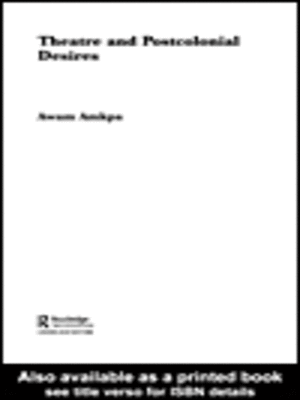Theatre and Postcolonial Desires
ebook ∣ Routledge Advances in Theatre & Performance Studies
By Awam Amkpa

Sign up to save your library
With an OverDrive account, you can save your favorite libraries for at-a-glance information about availability. Find out more about OverDrive accounts.
Find this title in Libby, the library reading app by OverDrive.



Search for a digital library with this title
Title found at these libraries:
| Library Name | Distance |
|---|---|
| Loading... |
This book explores the themes of colonial encounters and postcolonial contests over identity, power and culture through the prism of theatre. The struggles it describes unfolded in two cultural settings separated by geography, but bound by history in a common web of colonial relations spun by the imperatives of European modernity. In post-imperial England, as in its former colony Nigeria, the colonial experience not only hybridized the process of national self-definition, but also provided dramatists with the language, imagery and frame of reference to narrate the dynamics of internal wars over culture and national destiny happening within their own societies. The author examines the works of prominent twentieth-cewntury Nigerian and English dramatists such as Wole Soyinka, Femi Osofisan, Davd Edgar and Caryl Churchill to argue that dramaturgies of resistance in the contexts of both Nigerian as well as its imperial inventor England, shared a common allegiance to what he describes as postcolonial desires. That is, the aspiration to overcome the legacies of colonialism by imagining alternative universes anchored in democratic cultural pluralism. The plays and their histories serve as filters through which Ampka illustrates the operation of what he calls 'overlapping modernities' and reconfigures the notions of power and representation, citizenship and subjectivity, colonial and anticolonial nationalisms and postcoloniality. The dramatic works studied in this book embodied a version of postcolonial aspirations that the author conceptualises as transcending temporal locations to encompass varied moments of consciousness for progressive change, whether they happened during the hey day of English imperialism in early twentieth-century Nigeria, or in response to the exclusionary politics of the Conservative Party in Thatcherite England. Theatre and Postcolonial Desires will be essential reading for students and researchers in the areas of drama, postcolonial and cultural studies.







